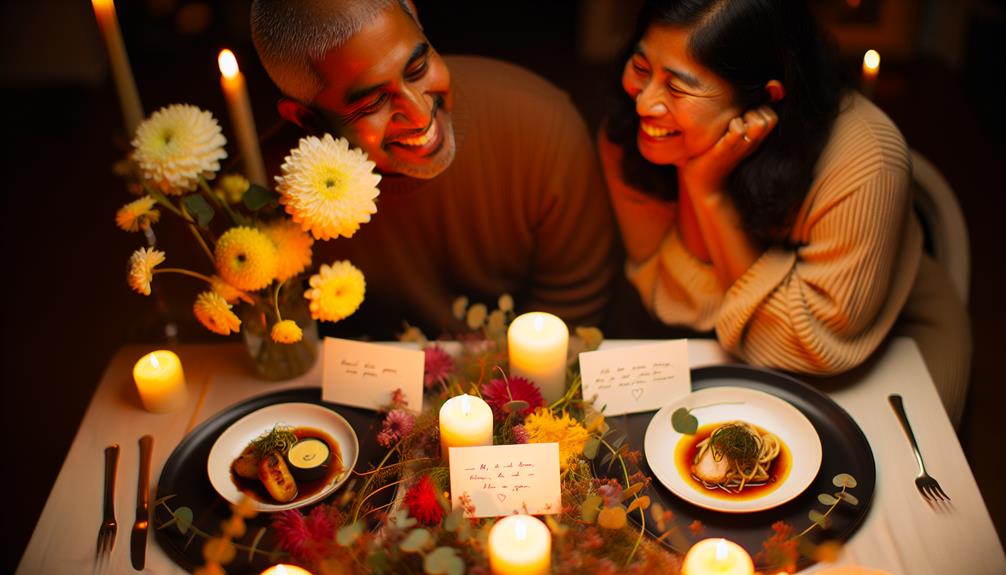Improving intimacy with your partner involves a blend of communication, quality time, and vulnerability. Start by engaging in open and honest discussions, creating a safe space for both partners to express their feelings and desires. Prioritize shared experiences, such as date nights or new hobbies, which can foster deeper connections. Simple gestures of physical affection, coupled with appreciation and gratitude, can greatly enhance emotional ties. Finally, sharing vulnerabilities helps cultivate trust and understanding. Embracing these practices can lead to a more fulfilling partnership and a stronger bond, paving the way for even more insights into nurturing intimacy.
Key Takeaways
- Communicate openly and honestly to build trust and understanding in your relationship.
- Prioritize quality time together through regular date nights and shared hobbies.
- Explore physical affection to enhance emotional bonds and create a comforting environment.
- Share vulnerabilities and feelings to foster emotional connection and transparency.
- Practice appreciation and gratitude to nurture a supportive and positive relationship environment.
Communicate Openly and Honestly

Effective communication is the cornerstone of any intimate relationship, serving as the foundation upon which trust and understanding are built. Open and honest dialogue fosters a safe space where both partners can share their thoughts and feelings without fear of judgment. Engaging in regular emotional check-ins is a crucial practice that allows couples to gauge each other's emotional well-being, ensuring that both partners feel seen and heard. Additionally, establishing routines that encourage open dialogue can help partners connect more deeply, similar to how remote customer service jobs foster flexible work environments that enhance personal balance.
Transparent conversations about emotions, needs, and desires strengthen the bond between partners. By discussing feelings openly, couples can navigate the complexities of their relationship more effectively, addressing any concerns before they escalate into larger issues. This practice not only nurtures empathy but also reinforces a sense of belonging and connection.
Listening actively and responding thoughtfully during these discussions invites deeper intimacy, as partners feel valued and appreciated. It's crucial to approach these conversations with compassion and a willingness to understand each other's perspectives. Ultimately, prioritizing open communication cultivates a resilient relationship where love can thrive, encouraging both partners to grow together in a supportive and nurturing environment.
Prioritize Quality Time Together
Prioritizing quality time together is essential for nurturing intimacy in relationships. Scheduling regular date nights and engaging in shared hobbies can create meaningful experiences that strengthen your bond. Additionally, finding fun activities like playing OVO Unblocked Games can add a playful element to your time together. By intentionally setting aside time for each other, you foster a deeper connection that enhances both understanding and affection.
Schedule Regular Date Nights
Scheduling regular date nights can be a transformative practice for couples seeking to strengthen their connection and deepen their intimacy. By prioritizing quality time together, partners can create memorable experiences that foster emotional closeness and affection. Date nights provide a dedicated space to reconnect, free from the distractions of daily life.
Consider incorporating elements such as romantic surprises or themed dates to enhance the experience. These small touches can reignite passion and create lasting memories, making each outing feel special and intentional. Here's a simple table to inspire your date night planning:
| Theme | Activity |
|---|---|
| Movie Night | Watch a favorite film together |
| Culinary Adventure | Cook a new recipe together |
| Nature Escape | Go for a scenic hike |
| Game Night | Play board games or video games |
| Cultural Experience | Visit a museum or gallery |
Engage in Shared Hobbies
Engaging in shared hobbies can considerably enhance the quality of time couples spend together, building a deeper bond and fostering intimacy. Joint activities not only provide an opportunity for connection but also allow partners to explore their interests collaboratively. This shared experience creates a sense of belonging and strengthens emotional ties.
Participating in creative projects can be particularly enriching, as it encourages teamwork and communication. Whether you choose to cook, paint, garden, or pursue a sport, the key is to find activities that resonate with both partners. Here are some tips for integrating shared hobbies into your relationship:
- Explore New Interests Together: Try something neither of you has done before to create lasting memories.
- Schedule Regular Hobby Time: Make it a priority to dedicate time weekly or monthly for your shared activities.
- Celebrate Small Wins: Acknowledge achievements in your joint projects, no matter how minor, to boost morale.
- Be Open to Each Other's Ideas: Encourage suggestions from both partners to guarantee everyone feels involved.
Explore Physical Affection
Physical affection serves as an essential component in nurturing intimacy within relationships. Engaging in physical closeness enhances not only emotional bonds but also fosters a sense of belonging and security. Simple practices, such as cuddle sessions, can create a comforting environment where partners feel valued and connected.
Incorporating spontaneous touches, like a gentle brush of the hand or playful teasing, can invigorate daily interactions, reminding both partners of their affection. Hand holding during walks or gentle massages while relaxing together can deepen physical connection, promoting relaxation and trust.
Surprise kisses or affectionate gestures, such as leaving notes or small tokens of love, serve to maintain excitement and warmth in the relationship. Eye contact during these moments is vital, as it reinforces emotional ties and conveys sincerity.
Share Vulnerabilities and Feelings
Sharing vulnerabilities and feelings is a powerful way to strengthen intimacy in relationships. Engaging in open conversations, practicing active listening, and participating in trust-building exercises can create a safe space for both partners to express their true selves. Additionally, couples can benefit from understanding the importance of thorough healthcare services, such as those offered by Syracuse Community Health Center, which can support mental and emotional well-being. By fostering this emotional connection, couples can enhance their understanding and support for one another, paving the way for deeper intimacy.
Open Up Together
How can couples truly deepen their connection in a world filled with distractions and surface-level interactions? One powerful way is through opening up together. Sharing vulnerabilities and feelings fosters intimacy and creates a safe space for both partners to express their true selves. Engaging in regular emotional check-ins can help partners understand each other's thoughts and feelings better, nurturing a deeper bond.
Consider the following approaches to encourage openness:
- Schedule regular emotional check-ins to discuss feelings and experiences.
- Share future aspirations to align your goals and dreams, reinforcing your partnership.
- Practice vulnerability by discussing fears, insecurities, and past experiences.
- Create a safe environment where both partners feel comfortable sharing without judgment.
Active Listening Skills
Active listening skills are essential for nurturing intimacy and fostering a deeper connection in relationships. By actively engaging with your partner during conversations, you create a safe space where vulnerabilities and feelings can be shared openly. This practice not only enhances emotional validation but also affirms that each person's feelings are worthy of acknowledgment and respect.
To cultivate active listening, focus on reflective questioning. This technique involves paraphrasing what your partner has expressed, inviting them to elaborate further. For instance, if your partner shares a concern, respond with, "It sounds like you're feeling overwhelmed. Can you tell me more about that?" Such questions can deepen understanding and demonstrate genuine interest in their emotional landscape.
Moreover, maintaining eye contact and using affirming body language signals that you are present and engaged in the moment. This connection can lead to heightened intimacy, as partners feel seen and supported. Remember, active listening is not merely about hearing words; it's about connecting with the emotions behind those words, fostering a relationship built on trust and mutual understanding. Embrace this practice to strengthen your bond and create a nurturing environment for both partners.
Trust-Building Exercises
Building on the foundation of active listening, trust can be further cultivated through intentional exercises that encourage partners to share their vulnerabilities and feelings. Engaging in these trust-building exercises not only enhances emotional intimacy but also fosters a safe environment where both partners feel valued and understood.
One effective method is to establish trust circles, where partners take turns sharing their thoughts and feelings without fear of judgment. In these circles, vulnerability prompts can guide discussions, prompting deeper connections. Consider incorporating the following elements into your trust-building routine:
- Daily check-ins: Allocate time to openly share feelings about your day.
- Vulnerability prompts: Use questions like "What's something you've never told anyone?" to initiate deeper conversations.
- Affirmation exchanges: Regularly express appreciation for each other's willingness to be vulnerable.
- Journaling together: Write about your feelings and share insights to foster understanding.
Plan Fun and Exciting Activities

Engaging in fun and exciting activities is essential for nurturing intimacy in relationships, as shared experiences can deepen emotional connections and create lasting memories. Adventure planning offers couples the opportunity to step outside their daily routines and explore new aspects of their relationship. Whether it's a weekend getaway, a hiking trip, or an art class, these activities foster a sense of togetherness and adventure. Just as P. Diddy's influence on music and fashion showcases the power of creativity and collaboration, couples can harness their own unique experiences to build a richer bond.
Spontaneous outings can also be incredibly beneficial; they inject surprise and excitement into your relationship. A last-minute decision to visit a local festival or try a new restaurant can reignite the spark and remind you both of the joy of discovery. These moments create a playful atmosphere, encouraging laughter and connection.
Additionally, planning activities that cater to both partners' interests guarantees that everyone feels valued and engaged. Consider alternating who chooses the activity, allowing both partners to contribute to the adventure. Ultimately, the key is to prioritize these experiences, as they cultivate a sense of belonging and unity. By embracing both planned adventures and spontaneous outings, couples can forge deeper emotional bonds that enhance their intimacy and overall relationship satisfaction.
Practice Active Listening
In the domain of deepening emotional connections, practicing active listening emerges as a fundamental skill that can transform interactions within a relationship. This technique not only enhances communication but also fosters emotional validation, allowing partners to feel heard and understood. By engaging in active listening, you create a safe space for your partner to express their thoughts and feelings, which is essential for intimacy. Additionally, just as effective study practices can greatly improve academic performance, honing your listening skills can lead to a more profound understanding and connection in your relationship top benefits of strong communication.
To cultivate effective active listening, consider the following strategies:
- Maintain eye contact to convey your full attention.
- Paraphrase what your partner says to demonstrate understanding and provide reflective responses.
- Ask open-ended questions to encourage deeper conversation and exploration of feelings.
- Avoid interrupting to show respect for your partner's thoughts and emotions.
These practices help to nurture a sense of belonging and connection. When partners feel that their words resonate, it reinforces trust and empathy in the relationship. By prioritizing active listening, you not only enhance your understanding of each other but also pave the way for more meaningful and intimate exchanges. Ultimately, this commitment to listening can deeply enrich your partnership.
Show Appreciation and Gratitude

Active listening lays the groundwork for deeper emotional connections, but it is the expression of appreciation and gratitude that truly nurtures and strengthens these bonds. Taking the time to acknowledge your partner's efforts, qualities, and contributions fosters a sense of belonging that is crucial in any relationship. Simple gestures, such as writing appreciation notes, can make a profound impact. These notes serve as tangible reminders of your partner's value and can encourage a positive atmosphere within your relationship.
Incorporating gratitude rituals into your daily routine can also elevate your emotional connection. This could be as simple as sharing three things you appreciate about each other at the end of the day. Such practices not only promote a culture of gratitude but also help partners feel seen and cherished in a world that can often feel overwhelming.
Ultimately, expressing appreciation and gratitude is about recognizing the inherent worth in your partner and the relationship itself. By prioritizing these expressions, you create a nurturing environment where both partners can thrive, feeling supported and valued, which is indispensable for lasting intimacy.
Frequently Asked Questions
How Can I Handle Disagreements Without Damaging Intimacy?
Handling disagreements without damaging intimacy requires a commitment to active listening and emotional vulnerability. Approach discussions with an open heart, acknowledging your partner's feelings while expressing your own needs. Create a safe space for dialogue, ensuring both parties feel heard and valued. By fostering mutual respect and understanding, you can navigate conflicts constructively, ultimately strengthening your bond. Embrace these moments as opportunities for growth and deeper connection within your relationship.
What Role Does Trust Play in Intimacy?
Trust is foundational to intimacy, as it fosters emotional vulnerability, allowing partners to share their innermost thoughts and feelings. Engaging in trust-building exercises can considerably enhance this bond, creating a safe space for openness. When individuals feel secure, they are more likely to express their true selves, leading to deeper connections. This supportive environment nurtures belonging, ultimately strengthening the relationship and promoting a profound sense of intimacy that is essential for lasting partnerships.
How Can I Rekindle Intimacy After a Long Period of Distance?
Rekindling intimacy after a prolonged period of distance requires intentional effort. Begin by fostering shared experiences, such as engaging in activities that both partners enjoy. This not only creates new memories but also strengthens the emotional connection. Incorporating physical touch through simple gestures—like holding hands or cuddling—can greatly enhance closeness. Approach this process with empathy and patience, understanding that rebuilding intimacy takes time and mutual commitment to rekindling the bond.
What Are Common Signs of Declining Intimacy in a Relationship?
Common signs of declining intimacy in a relationship often manifest through emotional disconnect and physical distance. Partners may find it challenging to share thoughts and feelings, leading to a sense of isolation. Additionally, reduced physical affection, such as decreased touch or intimacy, can be indicative of underlying issues. Recognizing these signs is vital for fostering connection and belonging, as addressing them early can help restore the warmth and closeness essential for a healthy relationship.
How Can External Stress Impact Relationship Intimacy?
External stress can considerably affect relationship intimacy, as it often leads to emotional withdrawal and diminished communication. When individuals experience high levels of stress, their capacity for emotional support may wane, resulting in feelings of isolation. Prioritizing stress management techniques can help partners navigate these challenges together, fostering a sense of belonging and understanding. By openly addressing stressors and offering mutual support, couples can strengthen their bond and nurture intimacy amidst external pressures.

